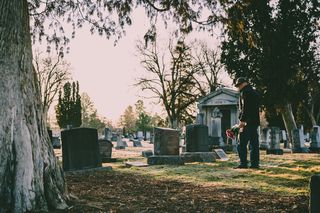Grief
Coping With Death During a Pandemic
In these unprecedented times, patience and flexibility are keys to coping.
Posted March 26, 2020 Reviewed by Matt Huston
Under ordinary circumstances, the Ice Palace in Madrid sounds like a nice place to visit. Boasting an Olympic-size ice rink, this building is normally used for skating lessons, hockey games, and birthday parties. However, this week, the Ice Palace is serving a totally different function: temporary morgue for the recently deceased, as deaths due to COVID-19 continue to mount in Madrid. Spain is not the only country scrambling to cope with COVID deaths: Iran has instituted mass burials and cordoned off cemeteries so that people cannot enter to say farewell to the dead, and in Italy, those who have lost loved ones are also mourning in isolation, with funerals delayed until the country is no longer on lockdown.
With mass casualties across the world and rates of COVID-19 infections and deaths rising in the U.S., Americans also need to be prepared to have to adapt our cultural practice of mourning. Already, funeral homes in the U.S. are limiting the number of mourners for deceased individuals (both COVID-positive and not) and offering live-streaming for services. This is far from an ideal situation for those mourning the loss of a loved one. According to Dr. Alan Wolfelt, an expert in healing in grief, funeral rituals are important parts of the grief process, helping us, among other things, to reconcile the loss, remember the dead, and connect with others.

So without these rituals and when in social isolation, how can one properly cope with loss-related grief?
How to cope with the loss of a loved one during a pandemic is, like the virus, a novel problem. However, coping with trauma has been studied extensively over many decades, and some of the principles that apply to other types of trauma might still be relevant. In their much-cited paper on coping and adaptation to trauma and loss, Mikulincer and Florian (1996) describe four types of coping mechanisms that people might employ:
- Try to address the problem head on: Problem-focused strategies are aimed at fixing or addressing the problem. Delaying memorials and streaming funeral services are two such solutions, and as more funeral homes face the challenge of helping families grieve the loss of loved ones, more solutions will likely be offered soon. Additionally, those coping with the death of a loved one might partake in some of the other rituals associated with mourning, including writing an obituary, connecting with loved ones via phone or video chat to share grief, and gathering information or making plans for an eventual service or celebration of life for their loved one.
- Focus on the silver lining: Instead of focusing only on the negative aspects of a situation, reappraisal involves trying to focus on the positive aspects of the situation. With regard to coping with grief during COVID, the silver lining might be hard to find, especially when people are not able to say goodbye to loved ones in ways that are important in their culture. However, finding comfort in social support and shifting one’s focus to the ways in which loved ones can be there for each other might be a good way to reappraise during this difficult time. People might also rely upon their religious or spiritual beliefs during these times, which may help them reframe the loss as a transition.
- Work through the experience by reorganizing one’s thoughts: Reorganization consists of several steps, including acknowledging the loss and taking time to really think about the experience so you can adapt to the new reality. Even without having to cope with a death, this is a stressful and confusing time. Everyone, and especially those coping with death, should give themselves time to mentally sort through and acknowledge the complexity of the situation.
- Not recommended—avoid coping altogether: Although this is a difficult and stressful time, not coping with trauma does not appear to be helpful in the long term. Avoidance can take many forms, such as denial, withdrawal, and even substance abuse. Although it can provide some short-term reprieve, avoidance does not help people process traumatic events. So although funerals might have to be delayed, the grief work people need to do in order to cope with the loss of a loved one should not be.
In sum, this is an unprecedented time, and the mourning and grief process will likely be very different than what we have known in our recent history. However, this does not prevent us from feeling grief and beginning to mourn the loss of the people we lose during this pandemic. It will be important to start doing grief work associated with the loss now and have patience with oneself later if mourning is extended or seems atypical.
Meanwhile, if you are trying to comfort those who have lost someone: Dr. Wolfelt advocates for companioning with someone through their coping with death, instead of trying to “treat” them. Now, perhaps more than ever, it is important for us to walk alongside those who have lost, listen to their feelings, and just be present. During this time of social isolation, it might be especially important for friends, family members, and support systems to bind together (from a distance) around those who are grieving.
Acknowledgement: Thanks to Carly Daley, medical writer, Parkview Center for Research and Innovation, for her contributions to this work.
References
Mikulincer, M., & Florian, V. (1996). Coping and adaptation to trauma and loss. In M. Zeidner & N. S. Endler (Eds.), Handbook of coping: Theory, research, applications (p. 554–572). John Wiley & Sons.


